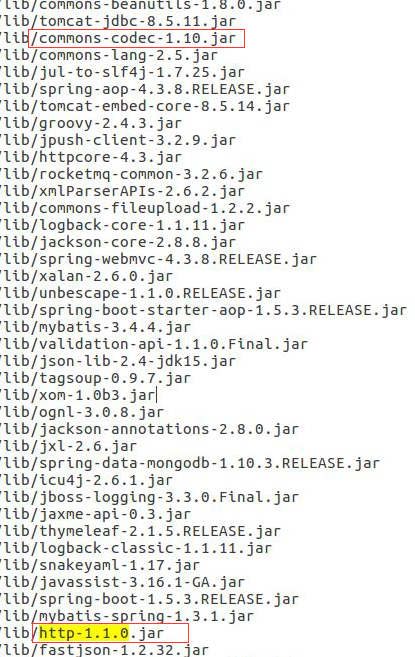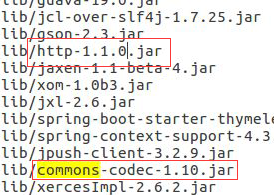使用-XX:+TraceClassPaths或者在服务器上执行jinfo时,都能得到classpath包含的jar包,例如:
java.class.path = local/aaa/lib/spring-data-redis-1.8.3.RELEASE.jar:/usr/local/aaa/lib/spring-tx-4.3.8.RELEASE.jar:/usr/local/aaa/lib/spring-jdbc-4.3.7.RELEASE.jar:/usr/local/aaa/lib/classmate-1.3.1.jar:/usr/local/aaa/lib/javax.servlet-api-3.1.0.jar:/usr/local/aaa/lib/mongodb-driver-3.4.2.jar:/usr/local/aaa/lib/xml-apis-2.0.2.jar:/usr/local/aaa/lib/ufc-api-utils-2.0.0.jar:/usr/local/aaa/lib/log4j-over-slf4j-1.7.25.jar:/usr/local/aaa/lib/tomcat-embed-websocket-8.5.14.jar:...
这些jar的顺序不同的机器总是不一样的,平时没有问题,所以也没有细想过,这些jar包的顺序为什么会不一样的。 在之前排查的一个问题 的结尾还留了一个问题,为什么有的机器会加载正确的类,有的就是错的。因为这一段在上线一个项目,灰度公测阶段,所以拖了些天,穿插着看了看加载相关的一些hotspot代码,以前也没看过,就边猜测边看了。因为是穿插着看,怕今天看的明天就忘了,所以后面一部分流水账记录了我看的过程。
总之,经过一番查代码,最终在rt.jar中找到了JarFile这个类,代码在jdk的src.zip包里的。 用 https://github.com/saaavsaaa/warn-report/blob/master/src/main/java/report/btrace/JarBTrace.java 脚本跟踪了一下:
正常的服务器脚本的输出:

异常的服务器上脚本输出:

这个问题在多台服务器上都出现了,所以搜集多台的输出后可以确认这个规律,其实在下面代码的记录中也可以看出,如果有多个同名的类只会加载其中第一个。在不出问题的服务器上commons-codec-1.10.jar是在http-1.1.0.jar之前加载的,而出问题的服务器正好相反。
/usr/lib/jvm/java-8-oracle/jre/lib/rt.jar!/sun/misc/URLClassPath.class中的private ArrayList
于是决定看看java.class.path初始化的情况,代码在/home/aaa/Github/hotspot/src/share/vm/runtime/arguments.cpp:_java_class_path = new SystemProperty(“java.class.path”, “”, true)。SystemProperty的构造在/home/aaa/Github/hotspot/src/share/vm/runtime/arguments.hpp:
// Constructor
SystemProperty(const char* key, const char* value, bool writeable) {
if (key == NULL) {
_key = NULL;
} else {
_key = AllocateHeap(strlen(key)+1, mtInternal);
strcpy(_key, key);
}
if (value == NULL) {
_value = NULL;
} else {
_value = AllocateHeap(strlen(value)+1, mtInternal);
ba(_value, value);
}
_next = NULL;
_writeable = writeable;
}
}; -----
构造里似乎没什么关系,然后回到cpp仔细看了下,发现:
// following are JVMTI agent writeable properties.
// Properties values are set to NULL and they are
// os specific they are initialized in os::init_system_properties_values().
// Set OS specific system properties values
os::init_system_properties_values();
这个方法的定义在os.hpp中,不过实现是不同的系统不一样,所以并没有在对应的cpp中,我是linux系统,所以我去找了 /home/aaa/Github/hotspot/src/os/linux/vm/os_linux.cpp,不过也没有我想要的。arguments.cpp中只找到了对endorsed,ext,bootclasspath的目录文件读取。
然后找到了-XX:+TraceClassPaths参数的输出位置: [classpath: …]的调用链:
/home/aaa/Github/hotspot/src/share/vm/runtime/thread.cpp:
// Parse arguments
jint parse_result = Arguments::parse(args); ```markdown
// Parse JAVA_TOOL_OPTIONS environment variable (if present)
jint result = parse_java_tool_options_environment_variable(&scp, &scp_assembly_required);
if (result != JNI_OK) {
return result;
}
// Parse JavaVMInitArgs structure passed in
result = parse_each_vm_init_arg(args, &scp, &scp_assembly_required, Flag::COMMAND_LINE);
if (result != JNI_OK) {
return result;
}
// Parse _JAVA_OPTIONS environment variable (if present) (mimics classic VM)
result = parse_java_options_environment_variable(&scp, &scp_assembly_required);
if (result != JNI_OK) {
return result;
} ``` parse_java_tool_options_environment_variable和parse_java_options_environment_variable都有调用parse_each_vm_init_arg,这里提一句_JAVA_OPTIONS会覆盖JAVA_TOOL_OPTIONS的同key配置。
parse_each_vm_init_arg这方法一进来就看到这么一段略坑,不过也无所谓了响。。。
if (!match_option(option, "-Djava.class.path", &tail) &&
!match_option(option, "-Dsun.java.command", &tail) &&
!match_option(option, "-Dsun.java.launcher", &tail)) {
// add all jvm options to the jvm_args string. This string
// is used later to set the java.vm.args PerfData string constant.
// the -Djava.class.path and the -Dsun.java.command options are
// omitted from jvm_args string as each have their own PerfData
// string constant object.
build_jvm_args(option->optionString);
}
这就是打印上面那句的地方:
jint Arguments::parse_each_vm_init_arg
Arguments::fix_appclasspath():
if (!PrintSharedArchiveAndExit) {
ClassLoader::trace_class_path(tty, "[classpath: ", _java_class_path->value());
}
然后[Bootstrap loader class path=/usr/lib/jvm/java-8-oracle/jre/lib/resources.jar:/usr/lib/jvm/java-8-oracle/jre/lib/rt.jar:/usr/lib/jvm/java-8-oracle/jre/lib/sunrsasign.jar:/usr/lib/jvm/java-8-oracle/jre/lib/jsse.jar:/usr/lib/jvm/java-8-oracle/jre/lib/jce.jar:/usr/lib/jvm/java-8-oracle/jre/lib/charsets.jar:/usr/lib/jvm/java-8-oracle/jre/lib/jfr.jar:/usr/lib/jvm/java-8-oracle/jre/classes]这一句输出:
/home/aaa/Github/hotspot/src/share/vm/runtime/init.cpp
jint init_globals()
/home/aaa/Github/hotspot/src/share/vm/classfile/classLoader.cpp
void classLoader_init() {
ClassLoader::initialize();
}
void ClassLoader::initialize()
void ClassLoader::setup_bootstrap_search_path()
大体上代码都在这一部分了,可以看出代码中并没有对加载顺序有所改变,然后比较重要的线索就是加载方法用的是opendir和readdir函数,在ios同事的协助下,终于确定了,问题就是jar的加载顺序问题,而这个顺序实际上是由文件系统决定的,linux内部是用inode来指示文件的。
于是写了个简单的c方法来验证,打印inode号:https://github.com/saaavsaaa/warn-report/blob/master/src/main/java/report/main.c
d_off:4066763678044974396 d_name: commons-codec-1.10.jar
d_off:4317940688349827723 d_name: commons-lang-2.5.jar
d_off:4319988583919237504 d_name: jul-to-slf4j-1.7.25.jar
d_off:4356646752930279233 d_name: spring-aop-4.3.8.RELEASE.jar
d_off:4579877846802590742 d_name: tomcat-embed-core-8.5.14.jar
d_off:4731608207059974753 d_name: groovy-2.4.3.jar
d_off:4771541818858258978 d_name: jpush-client-3.2.9.jar
d_off:4817159055427520488 d_name: httpcore-4.3.jar
d_off:5037058976412869958 d_name: rocketmq-common-3.2.6.jar
d_off:5112026581585883935 d_name: xmlParserAPIs-2.6.2.jar
d_off:5223887631628650300 d_name: commons-fileupload-1.2.2.jar
d_off:5270962929984509613 d_name: logback-core-1.1.11.jar
d_off:5295594039709144434 d_name: jackson-core-2.8.8.jar
d_off:5313324231349868064 d_name: .
d_off:5369671282559728007 d_name: spring-webmvc-4.3.8.RELEASE.jar
d_off:5480616600783493234 d_name: xalan-2.6.0.jar
d_off:5598132018198955916 d_name: unbescape-1.1.0.RELEASE.jar
d_off:5620136379821311472 d_name: spring-boot-starter-aop-1.5.3.RELEASE.jar
d_off:5639942392021544761 d_name: mybatis-3.4.4.jar
d_off:5688537857783605585 d_name: validation-api-1.1.0.Final.jar
d_off:5689351964973998306 d_name: json-lib-2.4-jdk15.jar
d_off:5708471019688158398 d_name: tagsoup-0.9.7.jar
d_off:5716046632217600256 d_name: xom-1.0b3.jar
d_off:5736731302988875630 d_name: p2p-repository-1.0-SNAPSHOT.jar
d_off:5770969695350360533 d_name: ognl-3.0.8.jar
d_off:5946256519116188501 d_name: jackson-annotations-2.8.0.jar
d_off:6011005565981751131 d_name: jxl-2.6.jar
d_off:6121401373763401899 d_name: spring-data-mongodb-1.10.3.RELEASE.jar
d_off:6155887434083949861 d_name: icu4j-2.6.1.jar
d_off:6203694621577639938 d_name: jboss-logging-3.3.0.Final.jar
d_off:6241670413890043636 d_name: jaxme-api-0.3.jar
d_off:6317802240634228683 d_name: thymeleaf-2.1.5.RELEASE.jar
d_off:6362118033392674189 d_name: logback-classic-1.1.11.jar
d_off:6391821784225315730 d_name: snakeyaml-1.17.jar
d_off:6447926989912518869 d_name: javassist-3.16.1-GA.jar
d_off:6586996539318953387 d_name: spring-boot-1.5.3.RELEASE.jar
d_off:6682174700565688505 d_name: mybatis-spring-1.3.1.jar
d_off:6858079168157560275 d_name: http-1.1.0.jar
对照前面正常服务器的截图可以发现,顺序和这是一样的。而出错的服务器:
d_off:7500897893766328572 d_name: http-1.1.0.jar
d_off:7630237192571233449 d_name: jaxen-1.1-beta-4.jar
d_off:7846439931967980783 d_name: xom-1.0b3.jar
d_off:7986273690820996399 d_name: jxl-2.6.jar
d_off:8013065173263952359 d_name: spring-boot-starter-thymeleaf-1.5.3.RELEASE.jar
d_off:8231450206996036007 d_name: spring-context-support-4.3.8.RELEASE.jar
d_off:8471297127500795042 d_name: jpush-client-3.2.9.jar
d_off:8635726305307688944 d_name: commons-codec-1.10.jar
同样可以对照上面错误服务器的截图,而且一般情况下,修改了文件名,再改回来,或者从新上传一个,这个编号依然还是这个,所以在出问题的服务器上问题稳定复现。那么,这个问题终于是可以告一段落了,原因搞清楚了,心理就有底了。解决什么的就随便了,我就随便把名字改成zzzhttp然后问题就在两个包都存在的情况下解决了。
d_off:8635726305307688944 d_name: commons-codec-1.10.jar
d_off:8710228832141418589 d_name: xercesImpl-2.6.2.jar
d_off:8722513994996448409 d_name: android-json-0.0.20131108.vaadin1.jar
d_off:8754081964290049159 d_name: ufc-api-utils-2.0.0.jar
d_off:8830796801498266528 d_name: httpcore-4.3.jar
d_off:8854152647200610772 d_name: tomcat-jdbc-8.5.11.jar
d_off:8971846312288780129 d_name: spring-tx-4.3.8.RELEASE.jar
d_off:8986236906371055996 d_name: bcprov-jdk15-1.45.jar
d_off:8988385379950226997 d_name: mysql-connector-java-5.1.30.jar
d_off:8994464230154278010 d_name: p2p-common-1.0-SNAPSHOT.jar
d_off:9012703293696799571 d_name: mybatis-spring-boot-starter-1.3.0.jar
d_off:9057592519440006836 d_name: zzzhttp-1.1.0.jar
下面是找线索的时候胡乱看的一些代码的记录,从启动部分开始找加载:
/jdk/launcher/java.c
int JLI_Launch(int argc, char ** argv, .... :
static void SelectVersion(int argc, char **argv, char **main_class):
if (splash_file_name && !headlessflag) {
char* splash_file_entry = JLI_MemAlloc(JLI_StrLen(SPLASH_FILE_ENV_ENTRY "=")+JLI_StrLen(splash_file_name)+1);
JLI_StrCpy(splash_file_entry, SPLASH_FILE_ENV_ENTRY "=");
JLI_StrCat(splash_file_entry, splash_file_name);
putenv(splash_file_entry);
}
if (splash_jar_name && !headlessflag) {
char* splash_jar_entry = JLI_MemAlloc(JLI_StrLen(SPLASH_JAR_ENV_ENTRY "=")+JLI_StrLen(splash_jar_name)+1);
JLI_StrCpy(splash_jar_entry, SPLASH_JAR_ENV_ENTRY "=");
JLI_StrCat(splash_jar_entry, splash_jar_name);
putenv(splash_jar_entry);
}
引用它的地方是:
/launcher/main.c :
int main(int argc, char **argv):
...
return JLI_Launch(margc, margv,
sizeof(const_jargs) / sizeof(char *), const_jargs,
sizeof(const_appclasspath) / sizeof(char *), const_appclasspath,
FULL_VERSION,
DOT_VERSION,
(const_progname != NULL) ? const_progname : *margv,
(const_launcher != NULL) ? const_launcher : *margv,
(const_jargs != NULL) ? JNI_TRUE : JNI_FALSE,
const_cpwildcard, const_javaw, const_ergo_class);
这里应该是应用启动的地方:
JavaMain(void * _args):
mainClass = LoadMainClass(env, mode, what);
appClass = GetApplicationClass(env);
LoadMainClass(JNIEnv *env, int mode, char *name)
NULL_CHECK0(mid = (*env)->GetStaticMethodID(env, cls,
"checkAndLoadMain",
"(ZILjava/lang/String;)Ljava/lang/Class;"));
(*env)->CallStaticVoidMethod(env, mainClass, mainID, mainArgs);
加载了启动类,根据参数类型什么的检查是不是启动类,然后调用,调用部分就到jvm里了,注意JNIEnv。
/share/vm/prims/jni.h:
typedef const struct JNINativeInterface_ *JNIEnv;
struct JNIEnv_ {
const struct JNINativeInterface_ *functions;
#ifdef __cplusplus
jint GetVersion() {
return functions->GetVersion(this);
}
jclass DefineClass(const char *name, jobject loader, const jbyte *buf,
jsize len) {
return functions->DefineClass(this, name, loader, buf, len);
}
jclass FindClass(const char *name) {
return functions->FindClass(this, name);
}
. . .
struct JNINativeInterface_ {
void *reserved0;
void *reserved1;
void *reserved2;
void *reserved3;
jint (JNICALL *GetVersion)(JNIEnv *env);
jclass (JNICALL *DefineClass)
(JNIEnv *env, const char *name, jobject loader, const jbyte *buf,
jsize len);
jclass (JNICALL *FindClass)
(JNIEnv *env, const char *name);
JNI_ENTRY(jmethodID, jni_GetStaticMethodID(JNIEnv *env, jclass clazz,
const char *name, const char *sig))
JNIWrapper("GetStaticMethodID");
JNI_ENTRY(void, jni_CallStaticVoidMethod(JNIEnv *env, jclass cls, jmethodID methodID, ...))
JNIWrapper("CallStaticVoidMethod");
#define JNI_ENTRY(result_type, header) \
JNI_ENTRY_NO_PRESERVE(result_type, header) \
WeakPreserveExceptionMark __wem(thread);
#define JNI_ENTRY_NO_PRESERVE(result_type, header) \
extern "C" { \
result_type JNICALL header { \
JavaThread* thread=JavaThread::thread_from_jni_environment(env); \
assert( !VerifyJNIEnvThread || (thread == Thread::current()), "JNIEnv is only valid in same thread"); \
ThreadInVMfromNative __tiv(thread); \
debug_only(VMNativeEntryWrapper __vew;) \
VM_ENTRY_BASE(result_type, header, thread)
上面那条线估计找不到什么了,从启动开始/share/vm/runtime/thread.cpp :
Threads::create_vm(JavaVMInitArgs* args, bool* canTryAgain):
jint init_globals() : // call constructors at startup (main Java thread)
HandleMark hm;
management_init();
bytecodes_init();
classLoader_init();
codeCache_init();
VM_Version_init();
os_init_globals();
stubRoutines_init1();
jint status = universe_init(); // dependent on codeCache_init and
// stubRoutines_init1 and metaspace_init.
. . .
/home/aaa/Github/hotspot/src/share/vm/services/management.cpp:
management_init()
这里启动了写有意思的东西,问题查完了需要看看,比如safepoint、PerfData什么的一些计数器,这里有ClassLoadingService先翻翻,有class的load和unload的通知什么的。
Bytecodes::initialize(),看样子所有的jvm指令都在这了。
classLoader_init:
ClassLoader::initialize():
ClassLoader::setup_bootstrap_search_path():
_shared_paths_misc_info->add_boot_classpath(sys_class_path);
setup_search_path(sys_class_path);
-->/share/vm/memory/universe.cpp :
jint universe_init()
--> /share/vm/memory/metaspaceShared.cpp: void Metaspace::global_initialize() --> void MetaspaceGC::initialize()这部分先标记下,回头看
void MetaspaceShared::initialize_shared_spaces(): initialize_shared_spaces方法中的注释:
Create the package info table using the bucket array at this spot in
the misc data space. Since the package info table is never
modified, this region (of mapped pages) will be (effectively, if
not explicitly) read-only.
The following data in the shared misc data region are the linked
list elements (HashtableEntry objects) for the symbol table, string
table, and shared dictionary. The heap objects refered to by the
symbol table, string table, and shared dictionary are permanent and
unmovable. Since new entries added to the string and symbol tables
are always added at the beginning of the linked lists, THESE LINKED
LIST ELEMENTS ARE READ-ONLY.
从注释来看,这次似乎接近了。而且Metaspace的功能很相关。 if (DumpSharedSpaces) { MetaspaceShared::prepare_for_dumping(); }
void MetaspaceShared::prepare_for_dumping() {
ClassLoader::initialize_shared_path();
FileMapInfo::allocate_classpath_entry_table();
}
/share/vm/memory/filemap.hpp :
bool FileMapInfo::initialize()
init_from_file(_fd);
void FileMapInfo::allocate_classpath_entry_table() :
void ClassLoader::create_package_info_table(HashtableBucket<mtClass> *t, int length,
int number_of_entries) {
assert(_package_hash_table == NULL, "One package info table allowed.");
assert(length == package_hash_table_size * sizeof(HashtableBucket<mtClass>),
"bad shared package info size.");
_package_hash_table = new PackageHashtable(package_hash_table_size, t,
number_of_entries);
}
...
serialize(&rc);
void MetaspaceShared::serialize(SerializeClosure* soc)
Universe::serialize(soc, true);
_finalizer_register_cache->serialize(f);
_loader_addClass_cache->serialize(f);
_pd_implies_cache->serialize(f);
_throw_illegal_access_error_cache->serialize(f);
// CDS support. Replace the klass in this with the archive version
// could use this for Enhanced Class Redefinition also.
void serialize(SerializeClosure* f) {
f->do_ptr((void**)&_klass);
}
// Dump/restore references to commonly used names and signatures.
vmSymbols::serialize(soc);
此处担心我翻译不好,还是直接看注释比较好。
MetaspaceShared::prepare_for_dumping():
ClassLoader::initialize_shared_path();
FileMapInfo::allocate_classpath_entry_table():
ClassLoaderData* loader_data = ClassLoaderData::the_null_class_loader_data();
size_t entry_size = SharedClassUtil::shared_class_path_entry_size();
for (int pass=0; pass<2; pass++) {
ClassPathEntry *cpe = ClassLoader::classpath_entry(0);
看到这,我有些方了,似乎找错地方了,应该去jdk里找找,后面就随便贴一下,反正根据命名和注释都能看出来是干什么。
interpreter_init(); // before any methods loaded
invocationCounter_init(); // before any methods loaded
marksweep_init();
accessFlags_init();
templateTable_init();
InterfaceSupport_init();
SharedRuntime::generate_stubs();
universe2_init(); // dependent on codeCache_init and stubRoutines_init1
referenceProcessor_init();
jni_handles_init();
#if INCLUDE_VM_STRUCTS
vmStructs_init();
#endif // INCLUDE_VM_STRUCTS
vtableStubs_init();
InlineCacheBuffer_init();
compilerOracle_init();
compilationPolicy_init();
compileBroker_init();
VMRegImpl::set_regName();
if (!universe_post_init()) {
return JNI_ERR;
}
javaClasses_init(); // must happen after vtable initialization
stubRoutines_init2(); // note: StubRoutines need 2-phase init
#if INCLUDE_NMT
// Solaris stack is walkable only after stubRoutines are set up.
// On Other platforms, the stack is always walkable.
NMT_stack_walkable = true;
#endif // INCLUDE_NMT
// All the flags that get adjusted by VM_Version_init and os::init_2
// have been set so dump the flags now.
if (PrintFlagsFinal) {
CommandLineFlags::printFlags(tty, false);
}
return JNI_OK;
}
然后就是向操作系统请求创建线程什么的,还有下面classloader也看了一些
/share/vm/classfile/classLoader.cpp
PackageInfo* ClassLoader::lookup_package(const char *pkgname) {
const char *cp = strrchr(pkgname, '/');
if (cp != NULL) {
// Package prefix found
int n = cp - pkgname + 1;
return _package_hash_table->get_entry(pkgname, n);
}
return NULL;
}
instanceKlassHandle record_result(const int classpath_index,
ClassPathEntry* e, instanceKlassHandle result, TRAPS) {
if (ClassLoader::add_package(_file_name, classpath_index, THREAD)) {
instanceKlassHandle ClassLoader::load_classfile(Symbol* h_name, TRAPS) :
ClassPathEntry* e = NULL;
#e = _first_entry;
void ClassLoader::setup_search_path(const char *class_path, bool canonicalize) {
int offset = 0;
int len = (int)strlen(class_path);
int end = 0;
// Iterate over class path entries
for (int start = 0; start < len; start = end) {
while (class_path[end] && class_path[end] != os::path_separator()[0]) {
end++;
}
EXCEPTION_MARK;
ResourceMark rm(THREAD);
char* path = NEW_RESOURCE_ARRAY(char, end - start + 1);
strncpy(path, &class_path[start], end - start);
path[end - start] = '\0';
if (canonicalize) {
char* canonical_path = NEW_RESOURCE_ARRAY(char, JVM_MAXPATHLEN + 1);
if (get_canonical_path(path, canonical_path, JVM_MAXPATHLEN)) {
path = canonical_path;
}
}
# update_class_path_entry_list(path, /*check_for_duplicates=*/canonicalize);
#if INCLUDE_CDS
if (DumpSharedSpaces) {
check_shared_classpath(path);
}
#endif
while (class_path[end] == os::path_separator()[0]) {
end++;
}
}
}
ClassFileParser parser(stream);
ClassLoaderData* loader_data = ClassLoaderData::the_null_class_loader_data();
Handle protection_domain;
TempNewSymbol parsed_name = NULL;
instanceKlassHandle result = parser.parseClassFile(h_name,
loader_data,
protection_domain,
parsed_name,
context.should_verify(classpath_index),
THREAD);
instanceKlassHandle result = parser.parseClassFile(h_name,
loader_data,
protection_domain,
parsed_name,
context.should_verify(classpath_index),
THREAD);
/share/vm/classfile/classFileParser.cpp 3700
上面加载类文件,从流中读取,流是classloader中传给ClassFileParser构造函数的。下面从dictionary中查找,字典结构,先hash出桶index,然后根据index查找:
/share/vm/classfile/systemDictionary.cpp
ClassLoaderData* loader_data = class_loader_data(class_loader);
unsigned int d_hash = dictionary()->compute_hash(child_name, loader_data);
int d_index = dictionary()->hash_to_index(d_hash);
Klass* probe = dictionary()->find(d_index, d_hash, name, loader_data,
protection_domain, THREAD);
Klass* check = find_class(d_index, d_hash, name, loader_data)
Klass* SystemDictionary::find_class(int index, unsigned int hash,
Symbol* class_name,
ClassLoaderData* loader_data) {
assert_locked_or_safepoint(SystemDictionary_lock);
assert (index == dictionary()->index_for(class_name, loader_data),
"incorrect index?");
Klass* k = dictionary()->find_class(index, hash, class_name, loader_data);
return k;
}
/share/vm/classfile/dictionary.cpp
Klass* Dictionary::find_class(int index, unsigned int hash,
Symbol* name, ClassLoaderData* loader_data) {
assert_locked_or_safepoint(SystemDictionary_lock);
assert (index == index_for(name, loader_data), "incorrect index?");
DictionaryEntry* entry = get_entry(index, hash, name, loader_data);
return (entry != NULL) ? entry->klass() : (Klass*)NULL;
}
DictionaryEntry* Dictionary::get_entry(int index, unsigned int hash,
Symbol* class_name,
ClassLoaderData* loader_data) {
debug_only(_lookup_count++);
for (DictionaryEntry* entry = bucket(index);
entry != NULL;
entry = entry->next()) {
if (entry->hash() == hash && entry->equals(class_name, loader_data)) {
return entry;
}
debug_only(_lookup_length++);
}
return NULL;
}
DictionaryEntry* bucket(int i) {
return (DictionaryEntry*)Hashtable<Klass*, mtClass>::bucket(i);
}
这个词典的数据结构扩展至hashtable,因为对外提供的是内联模板的方法,所以单独放在hashtable.inline,模板感觉就相当于泛型:
/hotspot/src/share/vm/utilities/hashtable.cpp :
#include "utilities/hashtable.inline.hpp"
/share/vm/utilities/hashtable.inline.hpp :
// The following method is MT-safe and may be used with caution.
template <MEMFLAGS F> inline BasicHashtableEntry<F>* BasicHashtable<F>::bucket(int i) {
return _buckets[i].get_entry();
}
上面查出来的东西,应该…不太确定,是这里加进去的,常量池的例子,开头那个问题里有:
/share/vm/oops/constantPool.cpp
void SymbolHashMap::add_entry(Symbol* sym, u2 value) {
char *str = sym->as_utf8();
unsigned int hash = compute_hash(str, sym->utf8_length());
unsigned int index = hash % table_size();
// check if already in map
// we prefer the first entry since it is more likely to be what was used in
// the class file
for (SymbolHashMapEntry *en = bucket(index); en != NULL; en = en->next()) {
assert(en->symbol() != NULL, "SymbolHashMapEntry symbol is NULL");
if (en->hash() == hash && en->symbol() == sym) {
return; // already there
}
}
SymbolHashMapEntry* entry = new SymbolHashMapEntry(hash, sym, value);
entry->set_next(bucket(index));
_buckets[index].set_entry(entry);
assert(entry->symbol() != NULL, "SymbolHashMapEntry symbol is NULL");
}
微信公众号:
